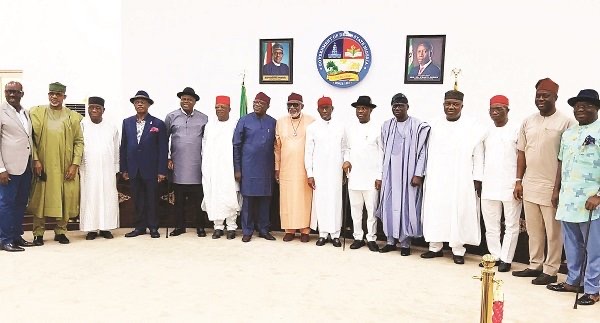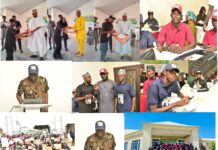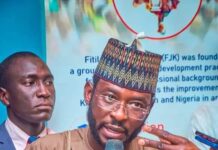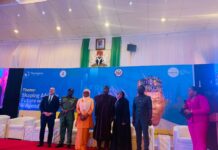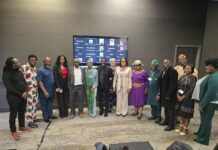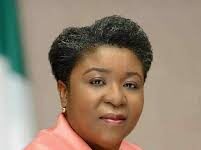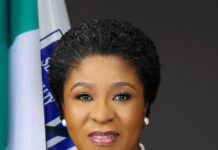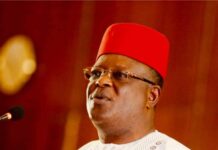Southern Governors Call For Urgent National Dialogue
Aiwerie Okungbowa, Mike Odiegwu and Bolaji Ogundele
POLITICS DIGEST – The clamour for dialogue to discuss the national question, got a huge boost on Tuesday.
Governors of the 17 southern states joined the fray by calling for the convocation of a national dialogue “as a matter of urgency.”
They took the position at their meeting in Asaba, the Delta State capital. The meeting was attended by 13 governors and two deputy governors who represented their principals.
Two governors – Adegboyega Oyetola (Osun), who is in Saudi Arabia for the lesser hajj, and Ben Ayade (Cross River) were absent.
It was the first such meeting since the President Muhammadu Buhari dispensation.
Hitherto, the governors met along their geo-political groups.
Other decision taken include the need for “urgent and bold steps” to restructure the country; the need for President Muhammadu to address the nation on the growing insecurity in the country and how he plans to arrest it and the enforcement of the ban on open grazing in the South, including preventing movement of cows “on foot” from the North.
The communiqué of the meeting was read by Ondo State Governor Rotimi Akeredolu, who was nominated by his colleagues after the session which lasted for one hour, 30 minutes between 1.30 and 3pm.
They recommended that in deference to the sensitivities of the various peoples of the country, there was a need to review appointments into Federal Government agencies (including security agencies) to reflect federal character as Nigeria’s overall population is heterogenous.
The communiqué said the governors “agreed that the progress of the nation require that urgent and bold steps be taken to restructure the Nigerian federation, leading to the evolution of state police, review of revenue formula in favour of sub-nationals and creation of other institutions which will legitimately advance our commitment to and practice of true federalism.
“The meeting recommended that in view of widespread agitation among various people for better inclusiveness in existing governance arrangements, the Federal Government should convoke a national dialogue as a matter of urgency.”
The meeting further resolved that open grazing be banned across Southern Nigeria, due to the menace posed by armed herders and its impact on food security.
It added that the Southern States would enforce the ban on open grazing, including cattle movement by foot and urged the Federal Government to support willing states to develop alternative livestock breeding systems.
They vowed to keep the unity of Nigeria on the basis of equity, justice and peaceful co-existence.
The communiqué also resolved to foster cooperation among the Southern states.
It expressed concern over the gridlock on the Oshodi/Apapa expressway in Lagos and the chokehold it has exerted on the nation’s economy, being the sole outlet from Apapa Wharf.
The governors recommended the activation and establishment of ports in other states of the federation to create new jobs and promote socio-economic activities in the country.
Read Also:
The governors expressed concern on the economic implications of another lockdown on the country, and suggested greater coordination and cooperation between Federal and state governments in evolving strategies for dealing with the pandemic.
How we will secure Nigeria, by NSA, CDS, IG
Also yesterday, the Federal Government outlined some measures it has adopted to halt the security menace.
National Security Adviser Maj.-Gen. Babagana Monguno (rtd), Chief of Defence Staff Gen. Lucky Irabor and Inspector General of Police Baba Usman gave an insight into some of the new measures.
They spoke at the end of the third meeting of the National Security Council (NSC) – the third in 11 days – presided over by President Buhari.
He added: “Specifically, issues of drug abuse as propellants for crime, how to make the criminal justice system much more effective, as well as looking at issues of unemployment, which of course, the Federal Executive Council had given an approval, through previous memos on how to get 100 million people out of poverty, that was also discussed. Then, again, the lack of an effective crime reporting system.
“Again, the President has given direction on how to make these things effective. Already, the NCC has been given certain instructions on how to deal with this, but Council has agreed that the level of insecurity in the country, especially in the last one month, is something that has to be addressed with the immediacy that it requires.”
Acting IG Usman, said President Buhari had approved new security measures for combating the situations in the Southeast and Southsouth regions.
Baba, who like the NSA refused to disclose details of the new instructions and plans for combating the situations, however, appealed to the public to assist the security in achieving success.
“We have some measures which we have outlined and have been approved by the Council and we’ll see how we can change the narrative within the quickest possible means to restore law and order and restore peace in that area”, he said.
Gen. Irabor said Council had been briefed on the activities of the armed forces so far and had considered their various needs.
“No doubt, far-reaching decisions were made. The Council was pleased with the actions and of course, the prayers that were made, which Council has also graciously undertaken to look into.
“These, of course, have to do with manpower development, training and equipment issues, and thankfully, the glow on my face should, of course, give you an indication as to the graciousness of the National Security Council, in relation to the briefings that we’ve given in this regard and I believe that going forward, we shall be translating that and it will have some great impact on the security disposition across the country”, he said.

